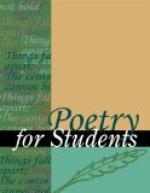|
This section contains 627 words (approx. 3 pages at 300 words per page) |

|
Narrow Fellow in the Grass
Summary: Analyzes the Emily Dickinson poem, Narrow Fellow in the Grass. Discusses Dickinson's use of imagery, graphic words, tone, and vivid descriptions. Explores the major themes.
The poem "A Narrow Fellow In The Grass" stems from the idea of things seeming to be one thing, but really meaning something else. Throughout the poem hints are presented through vivid descriptions. Graphic word choices also present the poems true meaning. These hints along with the poet's use of tone, title, and associations, help the reader understand the given piece. "A Narrow Fellow in The Grass" is a snake. This snake represents a warning towards the suddenness associated with death.
The narrow fellow is first described as creepily riding towards something, and suddenly being noticed. This sudden appearance associates a snake "occasionally" appearing, with the unexpectedness of death. This is because no one ever knows that death is around the corner, it suddenly appears when one is least prepared. The snake brings out the same feeling of being unprepared from its sudden appearance.
It becomes obvious that...
|
This section contains 627 words (approx. 3 pages at 300 words per page) |

|


